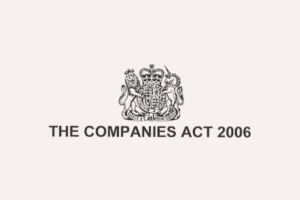Company directors have a number of legal responsibilities under the Companies Act 2006, Companies Act 2013, and other relevant legislation.
This guide will break down and simplify the key director responsibilities to be aware of.
Responsibilities Under the Companies Act 2006

The Companies Act 2006 sets out several general responsibilities for company directors:
- Duty to avoid conflicts of interest: Directors are required to avoid situations where their interests directly or indirectly conflict with those of the company. N.B. In companies where there are multiple shareholders, having a shareholder agreement can help outline how conflicts of interest should be managed, ensuring all directors are aligned with the best interests of the company.
- Duty to exercise reasonable care, skill and diligence: Directors have a responsibility to carry out their role with the degree of competence that would reasonably be expected from someone with their knowledge and professional experience.
- Duty to promote the success of the company: Directors must make decisions in the best interests of the company’s shareholders and for the benefit of the company as a whole.
- Duty to exercise independent judgement: Directors must make decisions independently without acting under the influence or direction of others.
- Duty to act within powers: Directors must act in accordance with the company’s constitution and only exercise powers allowed in the constitution.
- Duty not to accept benefits from third parties: Directors must refrain from accepting lavish gifts, excessive hospitality or other benefits from external parties that may be perceived as influencing their judgement or position as a director.
Directors can be held personally liable if they fail to meet these responsibilities. The consequences range from fines to disqualification from acting as a director. To avoid legal disputes, many companies will have clear business terms and conditions that outline the framework for director conduct and decision-making.
Responsibilities Under the Companies Act 2013
The Companies Act 2013 introduced some additional company director responsibilities:
- Duty to ensure the company’s registered office address and director details are accurate: Directors must notify Companies House of any changes to the company’s registered office address or director appointments/resignations.
- Duty to prepare a strategic report (for large companies): Directors of large companies must prepare a strategic report as part of the annual report analysing company performance.
- Duty to prepare a directors’ report (for large companies): Large companies must prepare a directors’ report including details on director remuneration, political donations, financial risk management, and other matters.
- Duty to avoid wrongful trading: Directors must avoid knowingly causing the company to continue trading when insolvent. This duty aims to prevent poor accounting practices. (In some cases, directors might need to negotiate settlement agreements with creditors to resolve financial disputes when insolvency looms.)
- Duty to maintain company records: Records relating to resolutions, meetings, members, directors, shares, and accounting must be properly kept and maintained.
Legal Responsibility of a Company Director for Company Debts
Company directors are not usually personally responsible for company debts and liabilities. A company has a separate legal personality, so responsibility lies with the company entity itself.
However, directors can become personally liable in some cases, including:
- If they continue trading when the company is insolvent, this breaches the duty to avoid wrongful trading. Directors can become personally liable for company debts built up during this time.
- If they fail to maintain proper company accounts and records, directors can become personally liable for losses caused by this failure.
- If they knowingly carry on wrongful trading, directors can be ordered to make a personal contribution to the company’s assets.
- If they are found guilty of fraudulent trading, directors can be made personally liable for company debts.
So, while directors are not directly responsible for company debts as a general rule, they should take care to avoid the above situations that could result in personal liability. In some cases, business sale agreements may need to be drafted to manage the transfer of assets and liabilities when attempting to save a struggling business.
Legal Responsibility of a Company Director When a Company is Sued
When a company is sued, the company itself will be the defendant rather than the directors personally. Directors are generally not personally responsible for any damages or costs awarded against the company.
There are two main exceptions where directors can be personally liable:
- If the lawsuit concerns a breach of duty they owe as directors to the company itself. For example, shareholders could sue directors for violating their Companies Act duties.
- If the director has offered a personal guarantee. For example, directors sometimes guarantee business loans or leases for which they can be held personally responsible.
Provided directors fulfil their legal duties and have not offered any personal guarantees, they will not have any personal responsibility if a company is sued. The company’s assets will be used to settle any damages awarded against it.
Legal Responsibility of a Company Director After Resignation
When a director formally resigns by giving notice to Companies House, they are no longer responsible for the company’s day-to-day management; their executive duties cease.
However, directors can remain liable for any acts or omissions during the period they were appointed. For example:
- They can still be held responsible for breaches of duty committed while they were a director. Legal action could be taken years later for past acts.
- If the company becomes insolvent within 12 months of them ceasing to be a director, liability for reckless/wrongful trading may still apply.
- They remain liable for any personal guarantees after resignation until released.
To avoid liability, it is advisable for resigning directors to:
- Comply with any notice period in their service contract.
- Inform key contacts like banks that they are resigning.
- Seek release from any personal guarantees.
Overall, directors resigning from their posts must still take care to tie up any loose ends that could lead to future liability.
Legal Responsibility of a Company Director if the Company Goes Bankrupt
If a company goes bankrupt, directors must act responsibly to minimise any losses suffered by creditors. Key company director responsibilities are:
- File for insolvency: Directors must take prompt action to file for insolvency and/or appoint a licensed insolvency practitioner if the company becomes insolvent and cannot pay debts.
- Compile information: Directors must provide company records and information to the appointed insolvency practitioner so that the practitioner can assess the financial situation.
- Attend creditors meetings: Directors may need to attend creditors meetings during the bankruptcy process.
- Cooperate with investigations: Insolvency practitioners will investigate the company’s failure, and directors must cooperate fully with this.
- Minimise losses: Directors should seek to retrieve assets and minimise losses as far as possible. For example, repaying certain creditors ahead of bankruptcy can become void.
During insolvency, directors continue to owe duties to the company’s creditors rather than members. Failure to properly comply with responsibilities can still result in personal liability and restrictions from acting as a director.
Consequences of Breaching Duties
Potential consequences if directors fail to meet their legal responsibilities include:
- Disqualification: If a court finds directors unfit to run companies, they can be disqualified from doing so for 2-15 years.
- Fines: Failure to submit documents and filings can lead to automatic fines. Breaches of other duties can also result in court-imposed fines.
- Imprisonment: Fraudulent trading, false accounting statements, and other serious breaches could potentially lead to imprisonment.
- Liability for losses: As covered earlier, directors can become personally liable to repay creditors for losses in some situations.
- Reputational damage: Conflicts of interest, improper accounting, and irresponsible behaviour damages a director’s reputation.
Given the severe potential penalties, it is vital for company directors to diligently fulfil their extensive legal duties and avoid any activities that could constitute misconduct. Seeking professional legal and financial advice is recommended where directors are unsure of responsibilities.
Frequently Asked Questions
Are directors responsible for company debt, and can a director be held responsible for limited company debt?
Directors are not usually personally liable for company debts. However, they can become personally liable if they continue trading when insolvent or engage in wrongful trading.
Is a director held responsible when a company gets sued?
Generally, no, unless the lawsuit is for breaching their duties as a director or involves a personal guarantee given by the director.
How long does a director have responsibility after resignation?
Directors remain liable after resigning for any acts and omissions during their period of appointment.
What responsibilities does a director have if the company goes bankrupt?
Responsibilities include filing for insolvency, providing information, attending creditors meetings, cooperating with investigations, and minimising losses.
Are directors responsible for filing company tax returns and paying tax?
Yes, directors must ensure company tax obligations are properly complied with. Failure could lead to fines and personal liability in some cases.
How should directors avoid conflicts of interest?
They must disclose any interests in proposed transactions, refrain from decision-making where interested, and follow company constitution rules on conflicts.
How do directors promote the company’s success?
By developing strategy, monitoring performance, ensuring adequate resources are available, complying with duties, and making decisions in the company’s best interests.
Can directors be fined or imprisoned for breaching duties?
Yes, fines and imprisonment are potential consequences of severe breaches like fraudulent trading and false accounting.
What is the minimum period of disqualification for unfit directors?
The minimum director disqualification period is two years. It can be as long as 15 years.
Contact us Today
Directors have numerous important legal responsibilities under the Companies Acts and other legislation. These responsibilities relate to promoting company success, exercising judgement and care, avoiding conflicts of interest, declaring relevant interests, maintaining company records, avoiding wrongful trading, and complying with company law procedures.
In most cases, directors are not personally liable for company debts and liabilities. However, personal liability can arise if they trade while insolvent, fail to maintain records, or offer personal guarantees. Directors remain liable after resignation for any acts and omissions during their tenure. They should tie up any loose ends when resigning. If a company becomes insolvent, directors must act responsibly and cooperate with insolvency practitioners to minimise losses suffered by creditors.
It is important to obtain expert guidance on your extensive company director responsibilities and liability risks. Our corporate lawyers can provide reliable advice on all your duties, help review contracts, transactions, and disclosures to minimise liability and assist if claims or insolvency arise. Contact Heald Nickinson today to discuss our services for directors. You can call us on 01276 680000 or message us via our website.
